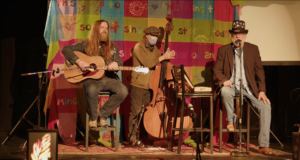Alderville First Nation Chief and fellow blues musicians open up Toronto International Storytelling Festival

By Rick Garrick
TORONTO — Alderville First Nation Chief Dave Mowat highlighted his great grandfather Fred Simpson’s 1908 Olympic Games marathon exploits during the Story and Song with Dave Mowat and Clayton Yates event at the Toronto International Storytelling Festival. Chief Mowat and fellow blues musicians Clayton Yates and Terry Wilkins opened the annual festival, held May 6-15, along with Six Nations teacher Otsistohkwi:yo, who delivered the traditional Haudenosaunee Thanksgiving Address.
“When I was about seven or eight-years-old, I became acquainted with my great grandfather, who was long passed, who was an Olympic marathon runner who raced for Canada in 1908 along with another fellow you might know by the name of Tom Longboat,” says Mowat, who performed blues music with Yates and Wilkins and shared stories during the Story and Song with Chief Dave Mowat and Clayton Yates event. “Longboat and my great grandfather, Fred Simpson, were the two Canadian Indigenous runners on the Canadian Olympic team in 1908. My great grandfather placed sixth for Canada and unfortunately Tom collapsed at 19 miles.”
Chief Mowat says his great grandfather was highlighted in the press in London, England, when the team was training there because Longboat had been training in Ireland with his manager.
“Plus, he was the only visible minority — it was amazing that they cracked that barrier,” Chief Mowat says. “That Olympic marathon was immortalized in film as well as some amazing photographs and that’s what I grew up with, was that legacy. That’s why I always believed our people were otherworldly almost because of what they accomplished.”
Chief Mowat says Otsistohkwi:yo did an “amazing” performance of the Thanksgiving Address, noting that a group of young people in his community have been learning Anishinaabemowin and doing well with their fluency.
“Everybody should, once in their life, learn and understand what the Indian Act is and what it did and what it attempted to do in Canada to Indigenous peoples,” Chief Mowat says. “That’s my reality, is working within the confines of that colonial construct called the Indian Act. It was a racist piece of legislation that sought to undermine the self-governing principles in our First Nations and in our Indigenous communities across Canada.”
Chief Mowat also spoke about his community’s Black Oak Savanna during the Story and Song with Dave Mowat and Clayton Yates event.
“I live on the edge of what we call the Black Oak Savanna, a tall grass prairie in Alderville First Nation, one of the most sensitive ecologies in southern Ontario, in Canada probably, a site of species at-risk,” Chief Mowat says. “So it’s nice to wake up early in the morning.”
Chief Mowat also highlighted Red Dress Day, which took place on the day before the opening of the Toronto International Storytelling Festival.
“Yesterday was the National Day for Missing and Murdered Indigenous Women and Girls and a very important day to make note of moving ahead,” Chief Mowat says, noting that the 2014 death of 14-year-old Tina Fontaine in Winnipeg brought back the time when he was in Winnipeg in the early 1980s. “I took up blues harmonica when I was in Winnipeg in the early 1980s. It made me go back to those days when I was downtown at the McLaren Hotel and the Leland Hotel and those old bars in Winnipeg, and it’s a pretty rough town. That’s what coloured some of my music, in essence that experience of the inner city in Winnipeg. It coloured a lot of the way I sort of started to play, it’s all about life, good or bad.”
Information about the Toronto International Storytelling Festival is posted online at: storytellingtoronto.org.


